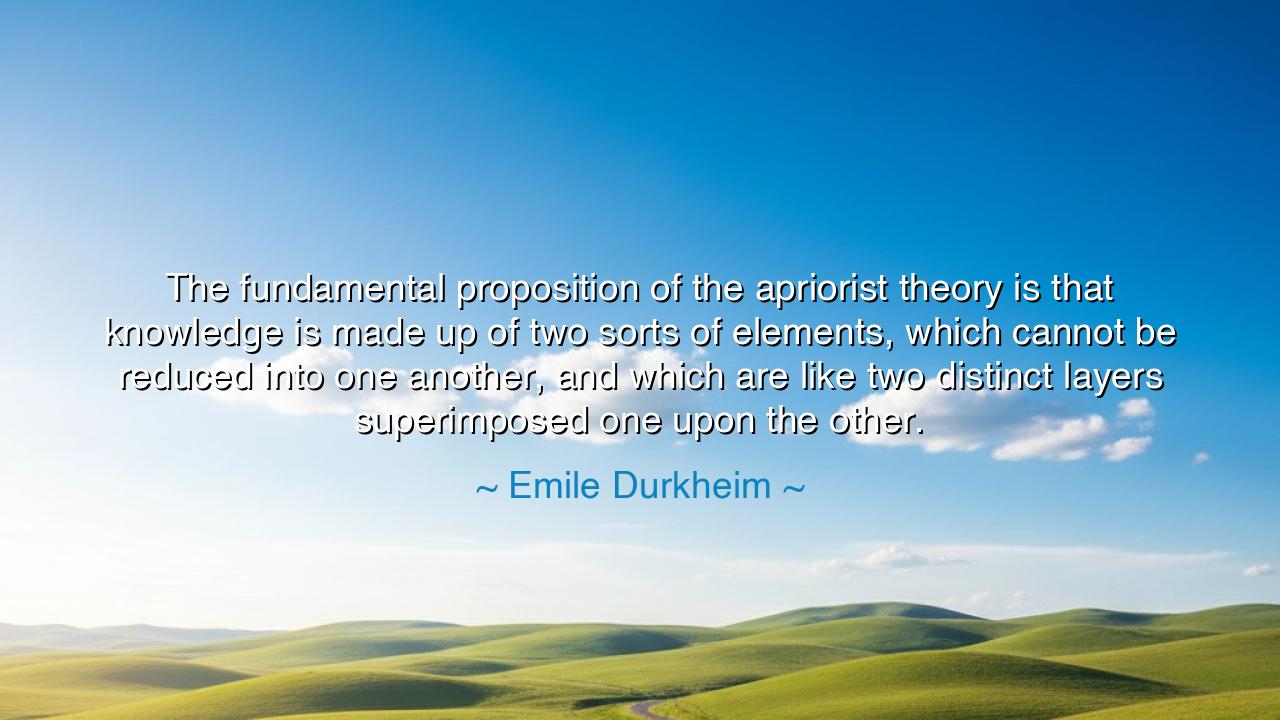
The fundamental proposition of the apriorist theory is that
The fundamental proposition of the apriorist theory is that knowledge is made up of two sorts of elements, which cannot be reduced into one another, and which are like two distinct layers superimposed one upon the other.






The words of Émile Durkheim — “The fundamental proposition of the apriorist theory is that knowledge is made up of two sorts of elements, which cannot be reduced into one another, and which are like two distinct layers superimposed one upon the other” — reach into the very heart of human understanding. In these lines, the great sociologist speaks not merely of philosophy, but of the mystery of how man perceives the world — how truth is born from both the mind and the experience of living. To the thoughtful soul, Durkheim’s insight is both humbling and liberating: we do not see reality as a single, simple thing. Rather, we stand between two realms — the inner and the outer, the eternal and the temporal — and knowledge is the bridge that binds them.
In the style of the ancients, we may say: “Man walks upon the earth, yet his gaze reaches the heavens.” So it is with knowledge. Durkheim’s apriorist theory reflects the belief, inherited from the great thinkers before him — from Kant, from the mystics, from the sages of old — that the mind contains truths prior to experience. These are the principles that order our thoughts: the sense of cause and effect, of time, of morality, of beauty, of justice. They are the a priori, the knowledge that precedes the senses, the foundation laid before we even begin to learn. But alongside them exists the empirical layer, the knowledge we gain through living — through observation, experiment, struggle, and memory. These two layers, Durkheim says, cannot be merged; one is born of the spirit, the other forged by the world.
The origin of this thought comes from Durkheim’s lifelong quest to reconcile individual experience with collective reality. He sought to understand not only how men think, but how societies shape that thinking. To him, knowledge was not merely personal discovery, but a social inheritance — built from generations of shared experience and collective imagination. Yet he also recognized that within each man lies something universal and timeless — the form of thought itself, which exists before any one culture, language, or moment in history. Thus, Durkheim’s vision was not cold philosophy, but a revelation: that truth is layered, like the stones of an ancient temple — one laid by heaven, the other by human hands.
Consider the story of the great astronomer Johannes Kepler, whose search for celestial order embodied Durkheim’s vision. Kepler looked to the skies not merely with the eyes of science, but with the heart of faith. Through observation, he gathered the empirical — the movements of planets, the geometry of their paths. But his discoveries were guided by something deeper: an inner conviction that the universe was designed according to divine harmony, that mathematics itself reflected the mind of God. Thus, his knowledge came from two layers — the observation of the senses and the intuition of the soul. Without the first, he would have had no data; without the second, no meaning. The marriage of both birthed his immortal laws of planetary motion — truth born from the union of heaven and earth.
Durkheim’s metaphor of superimposed layers reminds us that knowledge is not linear, but organic — it grows upward, nourished by both the soil of experience and the sunlight of intuition. When man forgets one of these layers, his vision becomes distorted. The scientist who trusts only data without reflection may know facts but not wisdom; the mystic who trusts only intuition without evidence may dream but never see. True understanding requires balance — the courage to observe and the humility to reflect, the discipline to learn and the faith to believe. Only then can we see the world whole, as both matter and meaning intertwined.
And so, the lesson is eternal: do not seek to simplify knowledge into one dimension. Accept its dual nature, for within it lies the harmony of existence itself. When you study the world, also study yourself. When you measure the stars, listen to the silence within your soul. The truths that endure — those that move civilization forward — are born when the human mind unites the outer reality of experience with the inner architecture of reason.
Let this be passed down as wisdom: that knowledge is a sacred union, not a conquest. It is the meeting of what is given and what is discovered, of what is seen and what is understood. The ancients knew this; Durkheim merely gave it new form. The man who would be wise must learn to walk with both feet — one upon the ground of experience, and one upon the unseen bridge of truth. For only then does he stand firm between heaven and earth, seeing not just what appears, but what is — as if two worlds, long divided, have at last been made one in the light of understanding.






AAdministratorAdministrator
Welcome, honored guests. Please leave a comment, we will respond soon